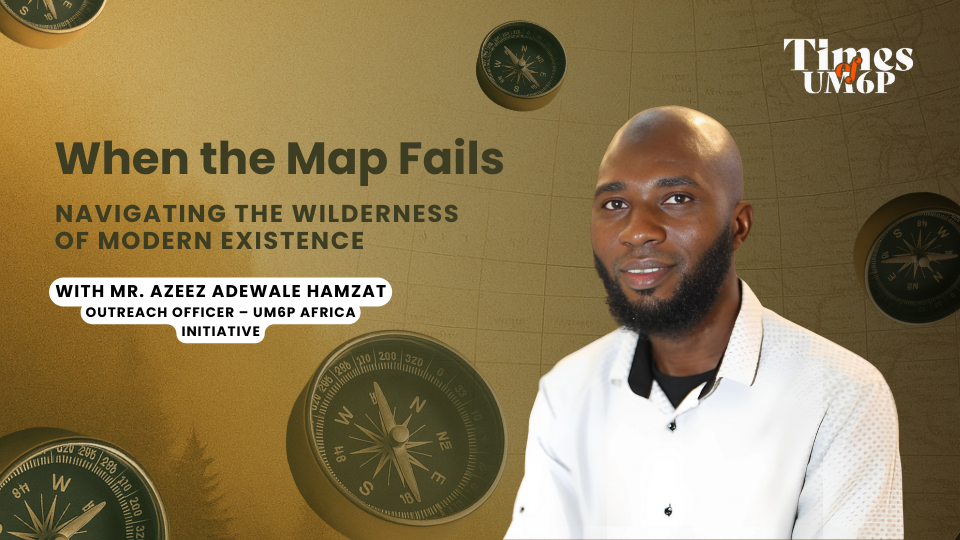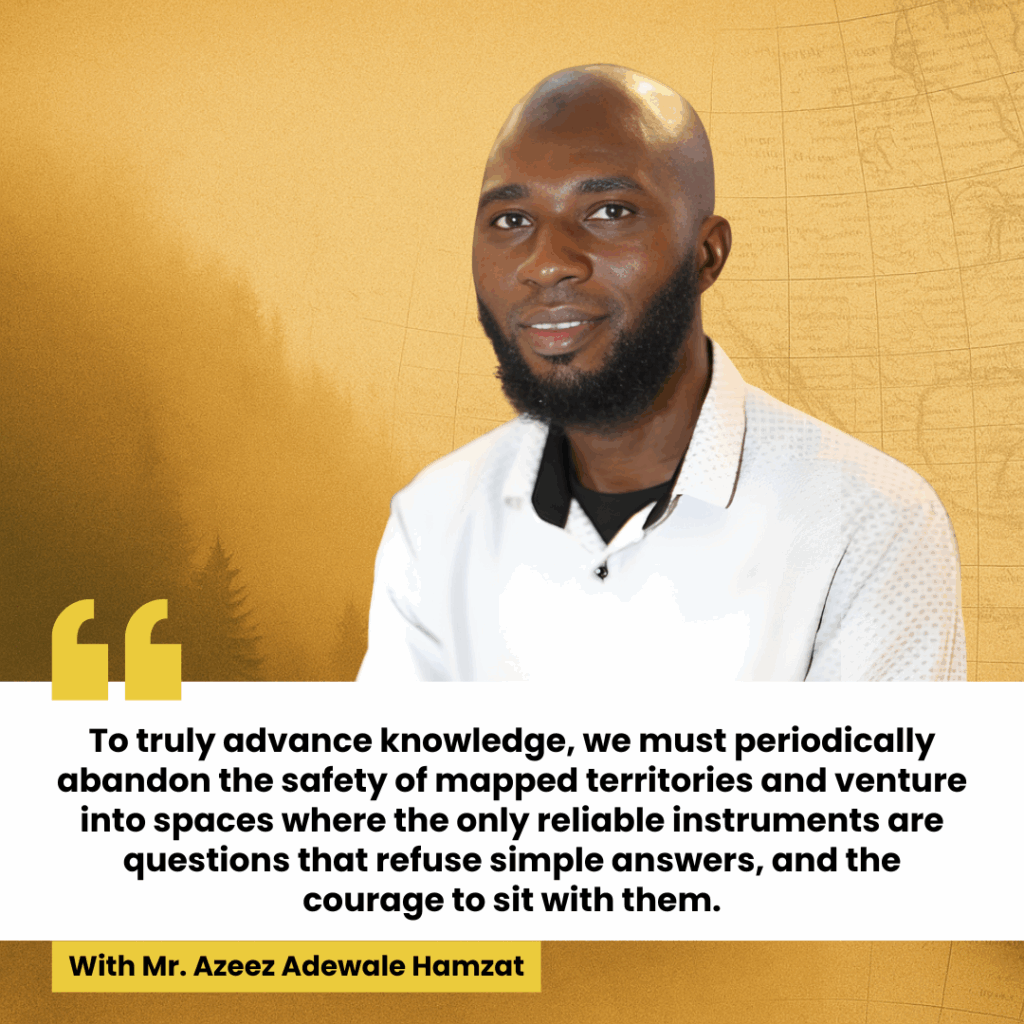By Azeez Adewale HAMZAT – Outreach Officer, UM6P Africa Initiative
Why This Essay Matters
This reflective essay explores the existential uncertainty often experienced in academic environments, particularly among doctoral researchers. Through the metaphor of being “lost,” it examines how modern metrics and external pressures can disconnect scholars from their internal compass and offers thoughtful perspectives on rediscovering meaning and purpose in intellectual pursuits. The article introduces two approaches to navigating uncertainty: the reactive “migrant” mindset versus the intentional “traveler” approach. By examining how our orientation toward uncertainty shapes our responses to academic challenges, the piece provides practical strategies for cultivating a more intentional relationship with scholarly work. Rather than viewing periods of feeling lost as failures, the article reframes them as necessary stages in intellectual growth and innovation. The piece speaks directly to researchers and students who find themselves questioning their path despite external achievements, offering a framework for reconnecting with the deeper purpose that initially drew them to their field.

Are You Really Where You Think You Are?
Have you ever looked up from your screen, your research, your endless to-do list, and suddenly wondered, “Am I lost?” Not geographically lost—technology solved that problem long ago—but lost in a deeper sense. Lost in purpose. Lost in meaning. Lost in the noise of modern existence.
It’s a startling question that emerges in those rare quiet moments when the constant hum of activity briefly subsides and we face the fundamental mystery of our own lives.
We live in an age of unprecedented guidance. GPS directs our travels, algorithms curate our experiences, and metrics chart our progress in nearly every domain. In academia, this manifests as impact factors, h-indices, and funding success rates, a constant stream of data that supposedly tells us where we are and how we’re doing.
Yet beneath this abundance of information lurks a curious irony: never have we been so precisely located in the external world, yet so frequently disconnected from our internal compass. We know exactly where we stand on the map, but not always in our lives. This disconnect is particularly poignant in doctoral research, where the pressure to produce measurable outputs can obscure the deeper purpose that initially drew many to their field of study.
This article explores how we might navigate this wilderness of modern existence, particularly within academic contexts. It examines how our approach to uncertainty shapes our experience, and offers perspectives on finding direction when conventional guideposts fail us. For researchers, educators, and students alike, understanding this internal landscape is as crucial as mastering our external disciplines.
Migrant or Traveler: Which One Are You?
When we feel disconnection, this lostness, we typically respond in one of two ways.
Many of us become what I call migrants of modern life. We move reactively, pushed forward by deadlines, expectations, and circumstances beyond our control. We rush from one obligation to the next, extinguishing fires and responding to demands. For PhD students, this might mean chasing publication requirements or conference deadlines without reconnecting to the questions that once fascinated them. We’re in motion, certainly, but the motion is largely reactive, a response to external forces rather than internal direction.
The alternative path is that of the traveler. Travelers move with intention and curiosity, guided by an inner compass even when the terrain is unfamiliar. They aren’t immune to external pressures, but these pressures don’t dictate their journey. A researcher with a traveler’s mindset pursues questions because they matter, not merely because they’ll yield publications. A student embraces difficulty not just to earn credentials but to transform their understanding.
The distinction isn’t about what we do, but how and why we do it.
Signs You’ve Lost Your Academic Compass
How do you know if you’ve slipped into the migrant pattern and lost your way? The signals are quiet but persistent:
You achieve goals that once seemed important, yet satisfaction remains curiously elusive. You publish in that prestigious journal or receive that grant, only to find yourself asking, “Is this all?” after reaching benchmarks you once thought would bring fulfillment.
Decisions become increasingly difficult, especially those that require clarity about what truly matters to you.
Which research direction to pursue, which collaboration to prioritize—without a functioning internal compass, every crossroads feels like a shot in the dark.
Your days take on a mechanical quality.
You collect data, run analyses, write papers proficiently, perhaps even excellently, but with a growing sense of disconnection from the questions driving your work.
And beneath it all runs a current of persistent unease, a sense that despite your academic productivity, something essential is missing.
Could Lostness Be a Hidden Gift?
What if these feelings of lostness aren’t failures to fix but invitations to heed?
History suggests that creative breakthroughs, scientific discoveries, and personal transformations often emerge not from knowing exactly where we’re going, but from being willing to wander into uncharted territory. Einstein’s thought experiments, Darwin’s explorations, Marie Curie’s persistent investigations—all were journeys into the wilderness of the unknown.
In our own lives as researchers and scholars, periods of feeling lost often precede our most significant growth. It’s when familiar frameworks prove insufficient that we’re forced to develop new ways of thinking. It’s when established methodologies fall short that we innovate. It’s when old certainties dissolve that space opens for more authentic questions to emerge.
Zoom Out: See the System, Not Just the Data

The traveler’s advantage lies partly in perspective, in the ability to see not just the immediate research question but the broader landscape it traverses.
When we feel lost in our academic work, we’re often zoomed in too close, fixated on immediate concerns—data collection, analysis, writing—without seeing their context. The traveler periodically steps back to perceive the whole system: how specific research connects to broader knowledge frameworks, how academic pursuits relate to societal needs, and how specialized questions link to universal human inquiry.
This wider view doesn’t eliminate complexity, but it makes it navigable. Instead of reacting to each academic obstacle in isolation, we begin to recognize patterns and relationships. We see not just where our research stands, but how it connects to the evolving body of knowledge it contributes to.
For PhD students, this systems perspective is especially valuable. It transforms the isolating experience of specialization into a meaningful participation in humanity’s collective quest for understanding.
How to Recalibrate When You’re Lost
If being periodically lost is inevitable in the academic journey, what helps us find our way again? Here, ancient wisdom and modern psychology converge around several practices:
- Cultivate wonder before strategy. When feeling lost in your research, your instinct is often to plan your way out, to strategize and problem-solve. But travelers know that orientation precedes navigation. Before asking “How do I get where I’m going?” ask, “What still genuinely fascinates me about this field? What questions continue to captivate me?” Wonder awakens the internal compass that strategy alone cannot provide.
- Embrace uncertainty as a creative space. The pressure to demonstrate expertise can make scholarly uncertainty feel threatening. Yet innovation emerges precisely from what we don’t yet know. Practice sitting with questions without immediately grasping for resolution. It’s in this seemingly unproductive space that original insight often germinates.
- Attend to different timescales. The migrant focuses primarily on the immediate publication or deadline; the traveler considers multiple horizons simultaneously. When making research choices, ask not just “What will this yield for my CV?” but “What understanding am I contributing to my field? What questions might this open for future scholars?”
- Remember that no one travels alone. Our most reliable navigation often comes through connection—to mentors who’ve walked similar paths, to colleagues who share our questions, to communities that remind us why our research matters. The myth of the solitary genius makes for good stories but poor science; meaningful discovery is nearly always a collaborative endeavor.
What If Lostness Is the Real Compass?

Perhaps the most essential quality for navigating academic life is a certain kind of courage—not the bravery to project confidence, but the subtler valor of acknowledging uncertainty. To resist the false comfort of premature conclusions. To stay with questions even when answers elude us.
As Rainer Maria Rilke advised a young poet: “Be patient toward all that is unsolved in your heart and try to love the questions themselves… Do not now seek the answers, which cannot be given you because you would not be able to live them. And the point is, to live everything. Live the questions now.”
This wisdom resonates particularly in research and education, where authentic discovery rarely follows a predictable path. The most transformative learning happens not when we grasp for certainty, but when we develop the capacity to explore complex questions with patience and genuine curiosity.
What if feeling lost in your academic journey isn’t a failure of navigation but an invitation to a more awakened scholarship? Perhaps being truly found isn’t about arriving at some final conclusion where all questions cease. Perhaps it’s about becoming more conscious of how we travel through knowledge—more intentional, more curious, more alive to the journey itself.
In that light, the question transforms from a worried “Am I lost in my research?” to a more generative “How am I traveling through this one wild and precious intellectual life?” And that question might be the truest academic compass of all.
About the Author
Azeez Adewale HAMZAT is a systems thinker and reflective writer whose academic journey bridges collective intelligence, educational innovation, and human development. Holding an MSc in Collective Intelligence and a background in Crop and Environmental Protection, he currently serves as Outreach Officer for the Africa Initiative at UM6P.
His work explores how researchers and institutions can move beyond metrics and rediscover meaning in the intellectual process. Whether writing, teaching, or speaking, Azeez draws on both scientific rigor and personal insight to create space for curiosity, reflection, and purposeful academic life.
You can connect with him via:
📧 az**********@**6p.ma
🔗 LinkedIn
🌍 azeezhamzat.com
References
Rilke, R. M. (1929). Letters to a Young Poet (M. D. Herter Norton, Trans.). W. W. Norton & Company.

Leave a Reply